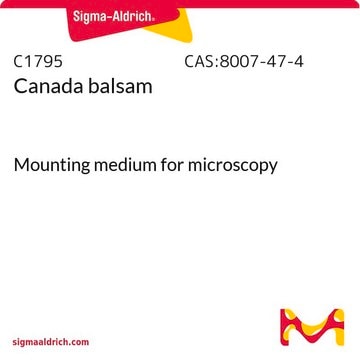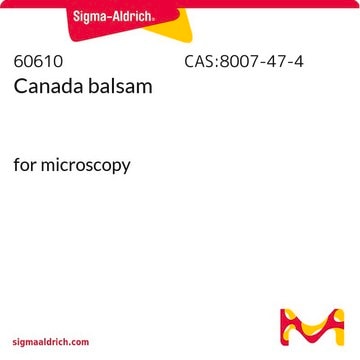C8392
Clove oil
Synonyme(s) :
Eugenia spp., Oil of cloves
About This Item
Produits recommandés
Forme
oil
Niveau de qualité
Indice de réfraction
n20/D 1.532 (lit.)
Point d'ébullition
251 °C (lit.)
Densité
1.04 g/mL at 25 °C (lit.)
Type de lipide
oils
Vous recherchez des produits similaires ? Visite Guide de comparaison des produits
Application
- Clove Essential Oil: Chemical Profile, Biological Activities, Encapsulation Strategies, and Food Applications: This review examines the chemical characteristics of clove essential oil, its biological effects, encapsulation methods, and its application in food industry, emphasizing its potential as a natural preservative and flavor enhancer (Liñán-Atero et al., 2024).
- Chitosan-Oxidized Pullulan Hydrogels Loaded with Essential Clove Oil: Synthesis, Characterization, Antioxidant and Antimicrobial Properties: This study describes the creation of chitosan-based hydrogels incorporating clove oil, detailing their synthesis, characterization, and their effective antioxidant and antimicrobial properties, useful in biomedical applications and food preservation (Suflet et al., 2024).
- Sustained release, antimicrobial, and antioxidant properties of modified porous starch-based biodegradable polylactic acid/polybutylene adipate-co-terephthalate/thermoplastic starch active packaging film: Research on biodegradable packaging films enhanced with clove oil, highlighting its sustained release capabilities and benefits in enhancing antimicrobial and antioxidant properties to extend the shelf life of packaged foods (Gui et al., 2024).
- Corn cob nanocellulose packaging for increasing the shelf life of food products: This article explores the use of corn cob nanocellulose as a packaging material, where clove oil could be utilized as a natural preservative to enhance the product′s shelf life and safety (Cheran et al., 2024).
Actions biochimiques/physiologiques
Code de la classe de stockage
10 - Combustible liquids
Classe de danger pour l'eau (WGK)
WGK 3
Point d'éclair (°F)
239.0 °F - closed cup
Point d'éclair (°C)
115 °C - closed cup
Équipement de protection individuelle
Eyeshields, Gloves, type ABEK (EN14387) respirator filter
Certificats d'analyse (COA)
Recherchez un Certificats d'analyse (COA) en saisissant le numéro de lot du produit. Les numéros de lot figurent sur l'étiquette du produit après les mots "Lot" ou "Batch".
Déjà en possession de ce produit ?
Retrouvez la documentation relative aux produits que vous avez récemment achetés dans la Bibliothèque de documents.
Les clients ont également consulté
Notre équipe de scientifiques dispose d'une expérience dans tous les secteurs de la recherche, notamment en sciences de la vie, science des matériaux, synthèse chimique, chromatographie, analyse et dans de nombreux autres domaines..
Contacter notre Service technique






